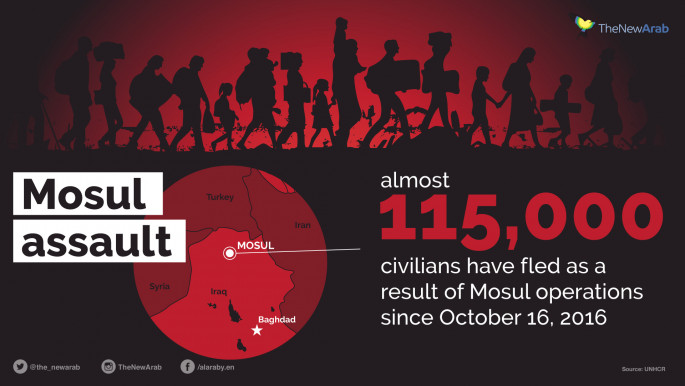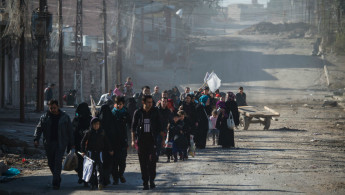Mosul: Most trapped civilians out of aid's reach
More than 10,000 Iraqis have been forced from their homes in Mosul in the last week alone with one million out of reach of humanitarian assistance, the UN has said, as Iraqi forces begin the second phase of its assault on the city.
It brings the total number of displaced civilians since the Mosul operations began to oust Islamic State militants to some 114,042 people, according to the latest report from the UN office for the coordination of humanitarian affairs (OCHA).
The number of people still living in IS-held parts of the city is unknown, the agency added, prompting concerns that the conditions for these communities are deteriorating, as basic goods have not been replaced in western parts of the city since supply routes were closed last month.
Meanwhile, opening more camps to receive the thousands fleeing the conflict is an urgent priority for the agency.
Just last week, an additional 10,170 people were displaced.
As well as flooding and sub-zero temperatures hampering relief efforts, security incidents have also affected aid operations.
On 22 December three suicide car bombs exploded in Gogchali, an area on the eastern outskirts of the city near to the main access route. These explosions were in addition to mortar fire that killed aid workers and civilians, including 11 children, just a few days earlier.
OCHA is also working to protect the more than 50,000 children affected by providing basic services, psychosocial support and education.
"This is going to be our main area of focus - to advocate for the education of children. This will also help to keep the children safe: they will be protected from being recruited, affected from the armed conflict, and they will also be able to access their basic rights," said Hamida Lasseko, Deputy Representative of the UN Children's Fund (UNICEF) in Iraq.
"We continue to ask all those who are involved in the conflict to leave children to grow as children so that they have a normal life," Lasseko said, emphasising that "they should stop using children for the benefit of the war".





 Follow the Middle East's top stories in English at The New Arab on Google News
Follow the Middle East's top stories in English at The New Arab on Google News
![Netanyahu furiously denounced the ICC [Getty]](/sites/default/files/styles/image_330x185/public/2024-11/GettyImages-2169352575.jpg?h=199d8c1f&itok=-vRiruf5)
![Both Hamas and the Palestinian Authority welcomed the ICC arrest warrants [Getty]](/sites/default/files/styles/image_330x185/public/2024-11/GettyImages-2178351173.jpg?h=199d8c1f&itok=TV858iVg)
